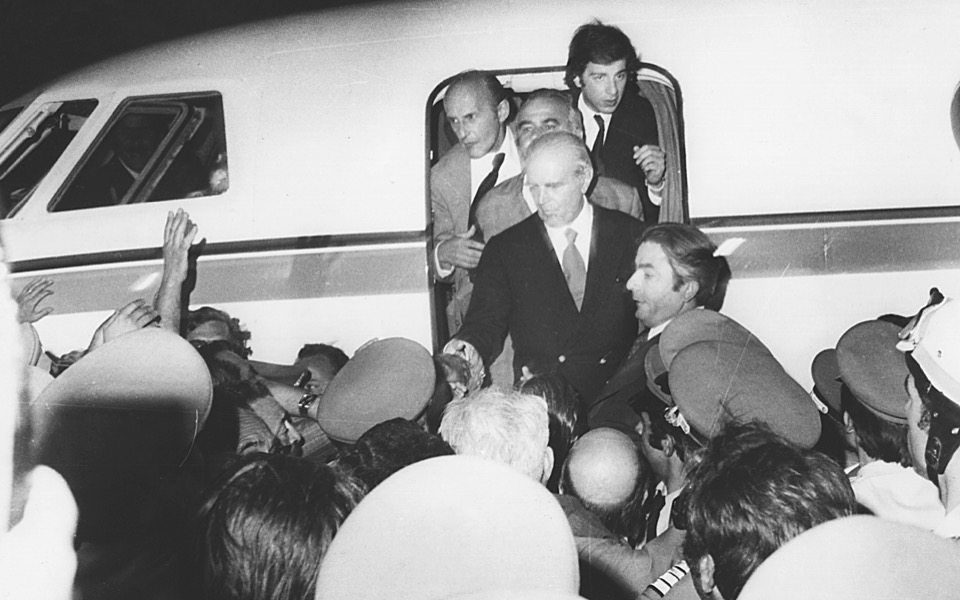The Promethean leadership model of Constantine Karamanlis

It has been 20 years since the death of Constantine Karamanlis. Unlike many other prominent political figures of the modern Greek state, that undoubtedly great leader and politician was fortunate enough to live to witness general acceptance and recognition of his words and actions. However, this broad acceptance and recognition only came toward the end of his life, following his second election to the Presidency of the Republic in 1990, and especially after the definitive end of his active presence in public life – in other words, when his opponents had no reason to fear nor envy his top leadership model and his posthumous “heavy political shadow.”
I) Some, especially younger people, may rightfully wonder – after all, as I know, deep inside he himself wondered – what the reason was for his being almost constantly challenged by his opponents and why even a large part of the electorate, at certain critical moments in our people’s and our nation’s history, “turned their back on him.” The answer is relatively simple: The leadership model chosen by Karamanlis throughout his political career, especially in the exercise of his duties as prime minister, was a Promethean one. Serious and reserved as he was, bordering on ambiguity in his political speech, and firmly opposed to all forms of demagoguery and populism, he chose high goals for Greece, goals that required real labor to achieve and often marked a long and upward path of dedication and creation. The two periods of his service as prime minister testify unambiguously to this:
A. During the first period, from 1955 to 1963, Karamanlis placed emphasis the social and economic development and reconstruction of the country. The ruins of the Second World War and the Nazi occupation, as well as the tragedy of the civil war, were still clearly visible in 1955. Thus, to Karamanlis’s mind-set, it was almost natural to focus his government’s efforts on securing economic growth, which, as subsequently proven, was the basis of the overall social and political transformation he sought. He faced heavy criticism for his choices. However, today, almost everyone will readily admit, on the one hand, that the balance of his contribution has been extremely positive, and, on the other, that due to this positive orientation, Greece’s mission to join the European institutions would have been completed much sooner if his fall and, most importantly, the nightmarish period of the seven-year dictatorship had not intervened.
B. Karamanlis’s second premiership period, from 1974 to 1980, was – unjust as this may seem toward his first – the period of his political distinction. All objective historians now accept that between 1974 and 1980 Karamanlis first laid the foundations for the democratic reconstruction of Greece, a major landmark being the 1975 Constitution – the longest, most democratic and most modern constitution since the beginnings of the modern Greek state. Even more so since this constitution, through the preceding referendum process, put an end to the painful adventure of deciding how the state would be governed. Besides this, he healed, mostly without turmoil and divisions (fatal for our people and nation), the open wounds of the fratricidal civil war. And, last but not least, he put Greece on a European track, exclusively due to his vision and the high regard with which he was internationally viewed, at a time when the technocrats of the European institutions were categorically opposed. His personal contribution in this direction was catalytically enhanced by the fact that the political opposition in Greece during that period was almost totally against him.
C. The two presidential mandates of Karamanlis, in 1980-85 and 1990-95, merely confirmed his contribution to the nation following the regime transition. Besides, the regime transition itself is historically connected with Karamanlis, who bears no significant share of responsibility for how his successors – especially his opponents – continued it, not being able to follow his own leadership and political model.
II. With the critical role he played during this period, Karamanlis left his indelible mark on modern Greek history.
A. As a leader and politician, Karamanlis rejected big words, the agony of promises and, above all, a divisive mentality. He defended the unity of the people, as “the eye of his eye,” by setting aside, when necessary, any personal ambition of his own.
1. His political aggregate will remain in history, its basic features being that his mistakes were not only far fewer and far less significant than his achievements, but also that those mistakes have in no way materially affected our national consciousness nor – more importantly – our national backbone.
2. Lastly, Karamanlis’s European vision led Greece – as soon as it was possible – to take its place among the member-states of the European family, not only to permanently shield its democratic foundations and national sovereignty, but also for it to have a say, especially as the cradle of European civilization, in the course of the European Union – that is, in the course of an international entity with a federal-like perspective, which must achieve its final political unification, both for its peoples and in order to fulfill the international role that it merits historically.
B. This political aggregate of Karamanlis’s work justifies in its entirety the following emblematic remark by Chris Woodhouse in his biography on the statesman: In Constantine Karamanlis’s days, mainly as prime minister and president of the Republic, Greece obtained a presence both intra and extra muros, both as a country and a state. And this is a historical advantage of Karamanlis over some of his predecessors of undeniable, enormous political range, such as Ioannis Kapodistrias, Charilaos Trikoupis and Eleftherios Venizelos: In their days, Greece was little more than a reflection of their own – unique, of course – powerful personalities.
What I have outlined might make people, especially our younger fellow citizens, wonder why, particularly when the political forces of the country were faced with the choice of electing Karamanlis as the president of the Republic, their answer was, in effect, a nonproductive denial. Let us not forget that Karamanlis, unlike other Greek presidents – including this writer – was only elected president of the Republic by a narrow margin: On May 5, 1980, with 183 votes – on the borderline of leading to early elections. And, after the parliamentary elections of May 4, 1990 – even worse – with just 153 votes! The answer, of course, to this reasonable question has already been provided, centuries ago, by Thucydides in his “History of the Peloponnesian War,” with Pericles uttering in his famous Funeral Oration the following deep analysis of envy, which, unfortunately, has always been a shortcoming of our nation:
“Praise of other people is tolerable only up to a certain point, the point where one still believes that one could do oneself some of the things one is hearing about. Once you get beyond this point, you will find people becoming jealous and incredulous.”
* Prokopios V. Pavlopoulos is the president of the Hellenic Republic.





